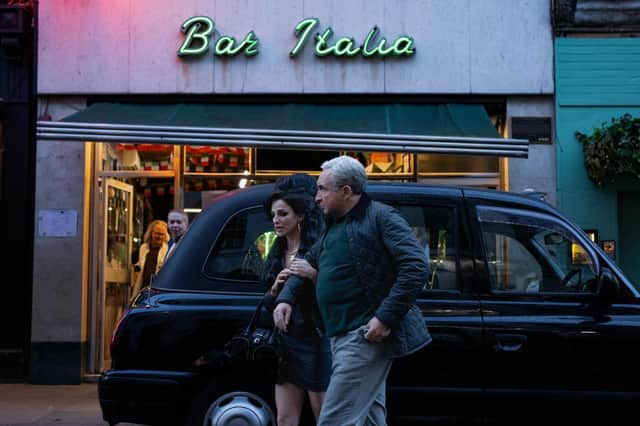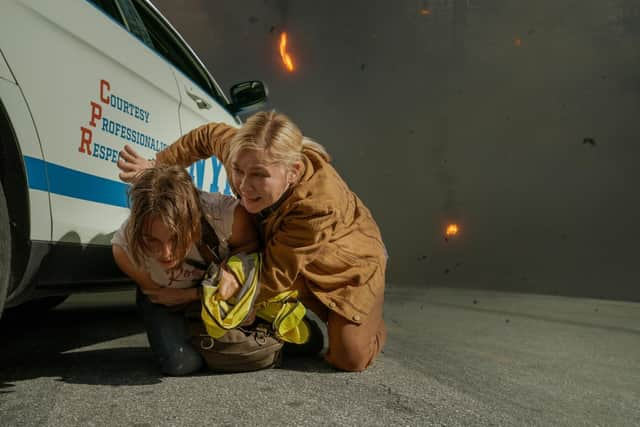Film reviews: So very not 50 shades of grey


Back to Black (15) *** | Civil War (15) ***
Amy Winehouse gets the biopic treatment in Back to Black, a largely celebratory portrait of the troubled London soul singer, who died from alcohol poisoning in 2011, aged just 27. Directed by Sam Taylor-Johnson, whose eclectic filmography — John Lennon bio Nowhere Boy, S&M blockbuster 50 Shades of Grey, rehab drama A Million Little Pieces — suggests she’s ideally suited to dramatise a life hitherto defined by pop stardom, masochistic relationships and substance abuse.
The film paints Winehouse (played by newcomer Marisa Abela) as a supremely talented artist whose raw and honest lyrics reflected the raw and honest way she lived her life. That’s something Asif Kapadia’s Oscar-winning archival documentary Amy did too, but Back to Black dramatises it in a very different way, exonerating those closest to her and presenting her as a woman out of her time, steeped in romanticised notions of a past that were at odds with the frenzied demands of 21st-century celebrity.


Advertisement
Hide AdThe film skips quickly through both her discovery and the release of her debut album Frank, filtering the period through her loving relationship with her nan, Cynthia Winehouse (Lesley Manville), a former jazz singer who inspired her retro look and sound even more than her close yet contentious relationship with her limelight-loving dad Mitch (Eddie Marsan).
As the film has it, it’s her initial disillusionment with the music industry that drives Amy into the arms of Blake Fielder-Civil, the drug-guzzling future husband frequently demonised as the reason for her downfall. Played with roguish charm by Jack O’Connell, Blake’s a laddish wideboy who doesn’t so much gaslight Winehouse as function as a conduit for her own addictive personality. As the film does with her father, it strives to humanise Blake, perhaps more than the fans who used to boo him at her gigs might like. But she also genuinely fell for him and their tempestuous relationship was a significant inspiration for her mega-selling Back to Black album and symptomatic of her own complicated feelings about men in general.
At the centre of it all, Abela’s generous performance captures Winehouse’s youthful vitality, and she acquits herself well during the performance scenes. But the film smooths off a lot of Winehouse’s rough edges, relegating her life-long struggle with bulimia to a brief mention and mostly dramatising the ravages of alcohol and heroin addiction through shots of the paparazzi hounding her day and night. It’s a very sanitised portrait in this way and even though there was a tragic inevitability to Winehouse’s demise, the film’s determination to follow her stated musical mantra of “making something good out of something bad” turns her life story into an oddly feelgood celebration of her talent that never quite gets under her skin.
One of the problems of making a futuristic film that could ostensibly have been “ripped from the headlines” is that the real life inspiration can sometimes prove more absurdly horrifying. Case in point? Alex Garland’s new dystopian thriller Civil War, a movie he’s told interviewers he wrote back in 2020, but which plays like the 6 January 2021 attack on the Capitol was a jumping-off point for its portrait of an America torn apart by insurrectionary fervour. The subsequent film may consciously avoid making easily identifiable political parallels, but such high-minded restraint also impacts its effectiveness.
Revolving around a group of journalists chasing an interview with the President as secessionist troops close in on Washington (Nick Offerman cameos as the embattled leader), the film drops us into the action as if we’re tuning into a news report of a conflict that’s been running for so long explainers are no longer offered, just grim images of the ongoing attrition, dutifully recorded, but lacking the power to change anything.
Such detachment reflects the professional mindset of its protagonists, especially veteran photographer Lee (an excellent Kirsten Dunst) and her fellow Reuters news agency stringer Joel (Wagner Moura). Both are seasoned war reporters who have borne witness to atrocities in combat zones around the globe, so the irony isn’t lost on them that they’re now covering a divisive conflict in their own country for the rest of the world to consume with similar indifference.
Advertisement
Hide AdJoining them on their cross-country trek to cover the fall of the White House are elderly New York Times journalist Sammy (Stephen McKinley Henderson) and twentysomething Jesse (Cailee Spaeny), an aspiring photographer who idolises Lee and feels compelled to get involved instead of waiting it out on a farm like her parents. Several times Garland takes potshots at this kind of do-nothing centrism, but the all-too-believable extremes encountered on the road suggest humanity is pretty much done for anyway, which makes for bleak, but also exasperating, viewing, not least because Garland frequently undermines the credibility of the film’s own reverence for reporters by never having them do anything as mundane as take notes, record interviews or file copy.
That said, cutting up his full-throttle action sequences with the photographs we see Lee and Jesse taking is a smart way of re-sensitising us to the unfurling violence. And though a lot of the film’s imagery can’t help but resemble The Walking Dead, the fact that we’re beyond using zombies as a metaphor for humanity’s decline provides its own chilling comment, something Garland rams home late in the film an with an incredibly tense scene featuring an unnerving cameo from Jesse Plemons as a quietly menacing soldier overly concerned with whether or not Lee and her colleagues are the right kind of Americans.
Back to Black and Civil War are in cinemas now
Comments
Want to join the conversation? Please or to comment on this article.